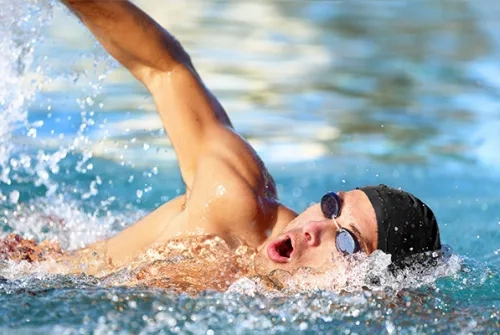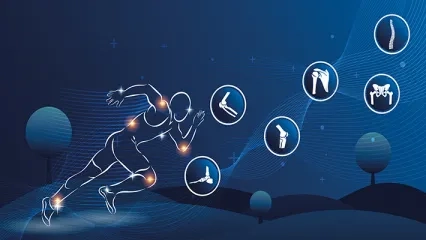Alo Yeditepe
Alo Yeditepe
Mistakes While Swimming Can Cause Shoulder Pain
Swimming is one of the most recommended activities by specialists as it is a sport branch in which the whole body is exercised, and muscle activity is high. However, pointing out that some common mistakes while swimming can cause pain in the shoulder area, Orthopedics, and Traumatology Specialist Prof. Dr. Gökhan Meriç gave important warnings.
Swimming, which is one of the most popular activities, especially in summer, is also very important in terms of energy expenditure. Swimming 1 km provides as much energy expenditure as running 4 km. However, both professional athletes and people who continue swimming as amateurs may occasionally experience pain in the shoulder area. Yeditepe University Hospitals Orthopedics and Traumatology Specialist Prof. Dr. Gökhan Meriç said that patients applying with complaints of pain after activity due to intense swimming, structural problems or another underlying cause increased during this period.
Swimming-related Shoulder Injuries
Stating that tendonitis (edema) in the shoulder muscles, shoulder impingement syndrome, which is the result of increased compression effect of the shoulder bone on the shoulder muscles when the arm is lifted, cartilage damage in the shoulder joint, tendonitis in the biceps muscle are among the common shoulder injuries caused by swimming, Orthopedics, and Traumatology Specialist Prof. Dr. Gökhan Meriç from Yeditepe University Bağdat Caddesi Polyclinic said, "If your shoulder pain recurs after every swimming or if you have pain for more than 2 days after swimming, this may be due to the shoulder problems mentioned above." Prof. Dr. Gökhan Meriç explained that among the reasons that cause this condition are over and intensive training, not enough rest time, poor swimming technique, poor breathing technique, low flexibility, unbalanced shoulder muscles, weakness especially in the central (core) region and decreased hip muscle strength.
Muscle Weakness Triggers Pain
In people with weakness in the muscles in and around the shoulder, the shoulder muscles are squeezed between the shoulder bones when the arm is lifted overhead, especially during swimming strokes, and pain may occur due to strain while pushing the water. Prof. Dr. Gökhan Meriç explained the reason for this as follows: "The shoulder joint is the most mobile joint of the body and it does this thanks to the flexibility of the surrounding capsule structure. However, in people with structurally more lax joints, more load on this capsule structure causes pain."
A Common Problem of 40-60 percent of swimmers
Stating that the main cause of the swimmer's shoulder problem, which occurs mostly in professional swimmers and is seen in 40-60 percent of swimmers, is unbalanced development in the shoulder muscles and movement problems in the shoulder blade, Prof. Dr. Gökhan Meriç continued his words as follows: "Swimmers are very knowledgeable about intense exercises and muscle strengthening that start early in the morning. However, what many do not know is that muscle imbalance or decreased flexibility can cause overuse injuries."
Take a Break from Swimming If You Feel Pain
Yeditepe University Hospital Orthopedics and Traumatology Specialist Prof. Dr. Gökhan Meriç said that in order to prevent shoulder injuries, it is necessary to warm up properly before swimming and to increase muscle strengthening before and during the season. He gave the following information about the measures that can be taken and the treatment approach: "It is necessary to apply ice to the shoulder 3-4 times a day. At the same time, it is necessary to use painkillers for 5-7 days. Patients with persistent shoulder pain despite rest and treatment are asked for shoulder MRIs. The patient's treatment is planned according to the MRI result. In simple disorders, patients benefit from physical therapy, exercise, and intra-shoulder injections. In cases where complaints persist despite treatment, closed interventions may be required."
This content was prepared by Yeditepe University Hospitals Medical Editorial Board.
”
See Also
- What are Hip Joint Diseases? Causes and Treatment
- Robotic Hip Replacement Surgery
- Knuckle Cracking Can Be Dangerous When It Becomes a Habit!
- What is Hallux Rigidus (Stiff Big Toe/Toe Arthritis)? Symptoms and Treatment
- What is Hallux Valgus (Bunion)? How is it Treated?
- Meniscus and Cartilage Transplantation Can Be Done at the Same Time
- What Causes Shoulder Dislocation? Shoulder Dislocation Treatment
- Ergonomics in Automobiles Prevents Accidents
- Joint Pain and Causes of Joint Pain
- Walking and Returning to Social Life After Knee Replacement Surgery
- What Are the Advantages of Robotic Knee Replacement Surgery?
- Robotic Knee Prosthesis Surgery
- Why Does Ankle Pain Occur? What Is the Treatment?
- The Usage Area of Robotic Surgery Expands in Orthopedic Surgeries
- Higher Risk of Anterior Cruciate Ligament and Ankle Injury in Female Athletes
- Patients Who Undergo Joint Replacement Surgery Can Stand Up and Walk the Next Day
- Spinal Fractures
- Big Toes Can Be A Big Problem!
- What is Synovitis in Joints?
- Hip Osteoarthritis and Hip Prosthesis
- Hip Impingement Syndrome
- What is the Future of Treating Cartilage Problems?
- Not Only Athletes Suffer from Meniscus Tears!
- Is Cartilage Damage More Common in Those Who Run for Long Periods?
- Beware If Your Shoulder Or Neck Pain Lasts Longer Than Two Days After Swimming!
- Myths About Fractures
- Vitamin D Deficiency May Be The Cause Of Your Joint Pain
- The First Onset of Pain in Cartilage Damage in the Knee Should Not Be Overlooked
- Have Your Baby Take Their First Steps in Good Health
- Heavy School Bags Can Cause Pain in the Lower Back, Shoulders, and Hands!
- Sports Injuries
- Cartilage Transplantation from Donor Has Been Started to Perform in Turkey
- Working From Home Increases Waist and Neck Problems
- He Walked Out Of The Hospital Where He Entered On Crutches
- First Cartilage Transplant from a Donor
- Pay Attention to the Pain That Occurs in the Front Part of Your Knees While Playing Sports!
- 8 Common Misconceptions About Sports Injuries
- Young Patient Who Could Not Walk Due to Cartilage Damage Recovered With Cartilage Transplantation
- Knee Arthritis
- Knee Pain
- Crunching in the Kneecap May Be a Sign of Calcification
- Injured Athletes Can Return To Sports With Cartilage Transplant
- Treatment of Knee Arthrosis Varies According to the Person
- A Lack of Attention to Sports Injuries in Children May Affect Their Development
Alo Yeditepe





